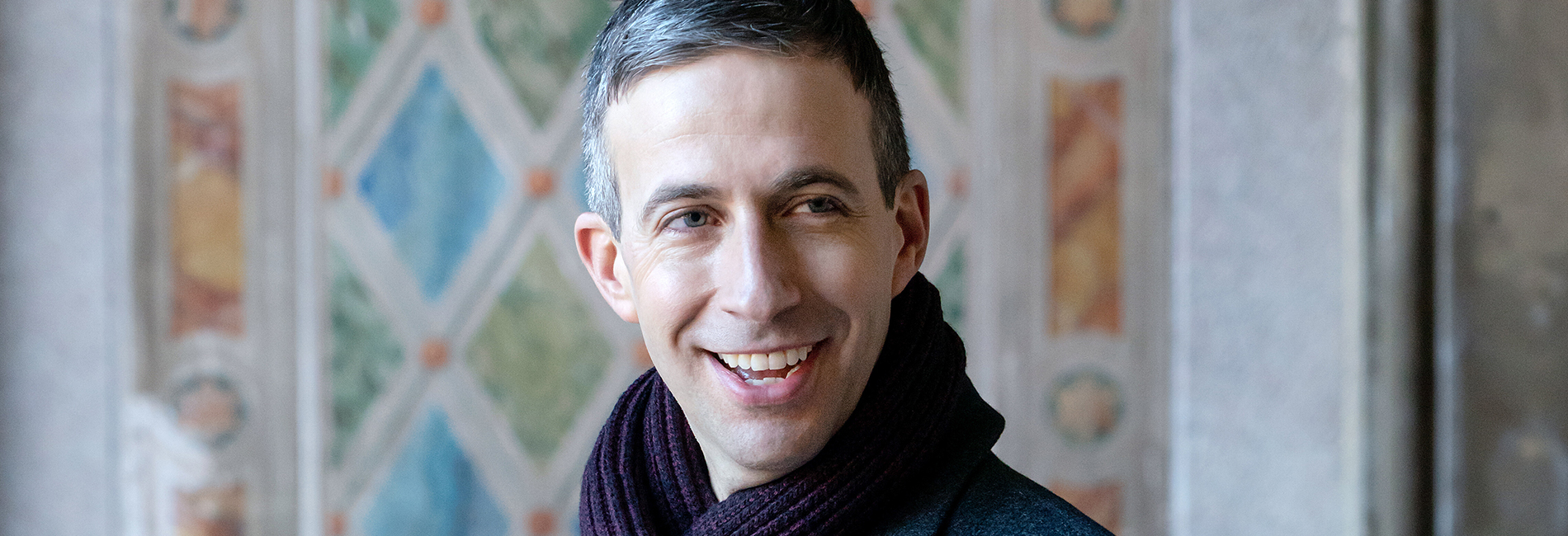
Special Interview with Benjamin Hochman
On June 2, 2024, Music Mountain's 95th Season Opening Benefit Concert & Reception will feature a stellar trio: Benjamin Hochman, piano, with two members of the Met Opera Orchestra, Concertmaster Ben Bowman, violin, and Assistant Principal, Joel Noyes, cello. Benjamin Hochman is a musician of exceptional versatility who regularly appears in multiple guises as orchestral soloist, recitalist, and chamber musician. In recent years he has ventured into the orchestral repertoire as a conductor. His wide range of partners and projects is matched by his curiosity, focus, and ability to communicate deeply with audiences.
In 2023, he and his musician friends opened Music Mountain's 94th Season. We are so excited to have him back at Music Mountain on June 2, 2024 to open our 95th Season.
Barbara von Bechtolsheim interviewed Benjamin Hochman on Friday, December 8th, 2023, for Music Mountain:
Interview
BvB: Benjamin, we are so excited that you have agreed to open the summer season 2024 at Music Mountain again. Last June you performed a program of Bach and Mozart. I wonder what your plans for the upcoming opening concert are.
BH: We are currently discussing this. It is likely to include piano trios by Beethoven and Schubert. I will be joined by two wonderful colleagues who are principal players of the Metropolitan Opera Orchestra: concertmaster Benjamin Bowman and Assistant Principal Cellist Joel Noyes. The three of us studied together at the Curtis Institute of Music, so we are old friends and have been talking about finding opportunities for making music together again. I am so excited and grateful that we will open the season together at Music Mountain. It will be very special because that link between music and friendship is what chamber music is all about.
BvB: In February 2024 you are going to perform at Carnegie Hall, a version of Beethoven’s Eroica is part of your program. How can you transform the heroic idea into chamber music?
BH: It is imperfect of course. The sound of the orchestra cannot be matched, only approximated. But the Heroic concept is not only about sound, it is an idea. The philosophical idea - and perhaps Beethoven would agree - is greater than the particular medium through which it is conveyed.
BvB: At the opening concert at MM you conducted from the piano. How is playing as a piano soloist different from immersing yourself in the ensemble and conducting?
BH: This is a great question and I find that my answers to it are constantly evolving. For me, it is a journey to expand my possibilities as a musician, to expand my leadership skills, my communication skills, and the scope of expression. My path as a conductor has been a bit unusual. Many conductors start young, whereas I had already been a pianist who had been performing for many years when I came to conducting. So for me, it is very much a journey of discovery, of discovering myself and discovering the music in these different modes. I love finding new ways, new possibilities. I believe it helps me grow as a musician and that is the most valuable thing to me.
We have an expression in Hebrew: “From all my teachers I have learned.” I am convinced of this. I also feel that I have learned so much from many inspiring colleagues.
—Benjamin Hochman
BvB: You spent several summers at the Marlboro festival under Mitsuko Uchida and Richard Goode. In reviews of your Mozart piano concerto recordings you have been compared with Daniel Barenboim and Murray Perahia. Who are your major influences?
BH: Each of the artists you mention has been a strong influence on me, each in a different way and at different moments in time. However, my strongest influences are the teachers with whom I’ve worked for extended periods of time. I have been very fortunate to have had the teachers that I’ve had.
When I was growing up in Israel, I studied from a young age with Esther Narkiss, who is now 93 years old. She was a strong influence on me. Then, Emanuel Krasovsky, who was my teacher in Tel Aviv before I came to Curtis. When I was a student at Curtis in my late teenage years, Claude Frank was my teacher. Richard Goode was my next teacher, with whom I studied at Mannes in New York and with whom I am in close contact to this day. Later, I studied conducting with Alan Gilbert at Juilliard. Each of these teachers was tremendously important and influential to me.
Additionally, there are others that one encounters who are not teachers per se, but who are still very strong influences. One of these, more recently, has been Daniel Barenboim. During the pandemic, when I had just moved to Berlin, I was asked to play Beethoven sonatas for him in a masterclass that was filmed at the Pierre Boulez Saal. Another influence on me has been the Hungarian pianist András Schiff. Although he has not been my teacher, he has nevertheless been a major influence on me. We have an expression in Hebrew: “From all my teachers I have learned.” I am convinced of this. I also feel that I have learned so much from many inspiring colleagues.
BvB: Like the two artists with whom you will perform at Music Mountain?
BH: Exactly. Chamber music is so wonderful because there is no built-in hierarchy, it is about being equals - even though that is always the case in music making. But conducting comes with the expectation that you are the leader in that situation. In chamber music, in one phrase you might be the leader, in another phrase it might be the violin and in the next phrase it might be the cello.
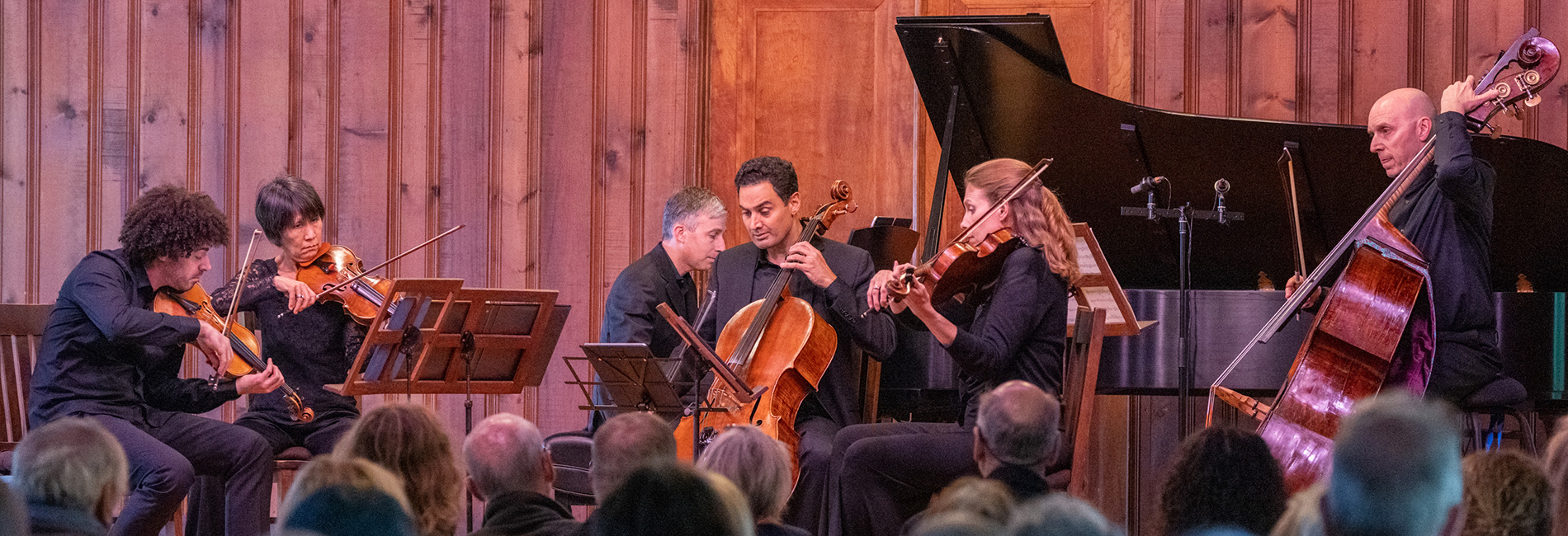
Benjamin Hochman performing at Music Mountain in 2023. From Left: Kobi Malkin and Nancy Wu, Violins; Benjamin Hochman, Piano; Raman Ramakrishnan, Cello; Jessica Thompson, Viola; Leigh Mesh, Double Bass. Photo by Anne Day
BvB: You mentioned your upbringing in Israel and your teachers there. What was your dream for your musical life at that time?
BH: I didn’t really think about it that way, I was always interested in doing the next thing. When I was assigned a Beethoven Sonata, as soon as I had memorized and performed it, I was ready for the next piece. I was always very focused on the task at hand. Of course, one has dreams, but there is something very compelling about reality, what you are doing in reality is the most important thing in that moment. It was later that things started to happen. I remember meeting Isaac Stern and being invited by him to play at Carnegie Hall for the first time at age twenty. That is a kind of dream where you don’t dare to think it will happen - and then it happens. You do it and you do it well and you think: this is great. Certain things just began to happen.
BvB: We talked about your teachers, but now you are a teacher yourself. What is your guidance when you teach?
BH: It is a great responsibility to be a teacher. I think that way because my teachers were so wonderful. I want to live up to that. It is a responsibility toward the young person, and it is also a responsibility toward the music itself. The word “tradition” is a complicated word, it can be a dangerous word, it can be misused, but in the purest and most positive sense we pass traditions on to the next generation. Whether one is playing a Beethoven sonata or a work by Ravel or Bartók - even with the music of our time - you want to learn how these pieces should go. This is one of the responsibilities of teaching, to pass on traditions in a positive way. At the same time, I want to give tools. A student will come for an hour or two and you want to give as much information as can be incorporated and understood during that time. Hopefully what you teach in that hour is not only for the piece you are working on but for many other pieces. You want to teach the students to teach themselves. Maybe the most important thing is to be a decent human being and to be nurturing. If we don’t do that as teachers - what are we doing?
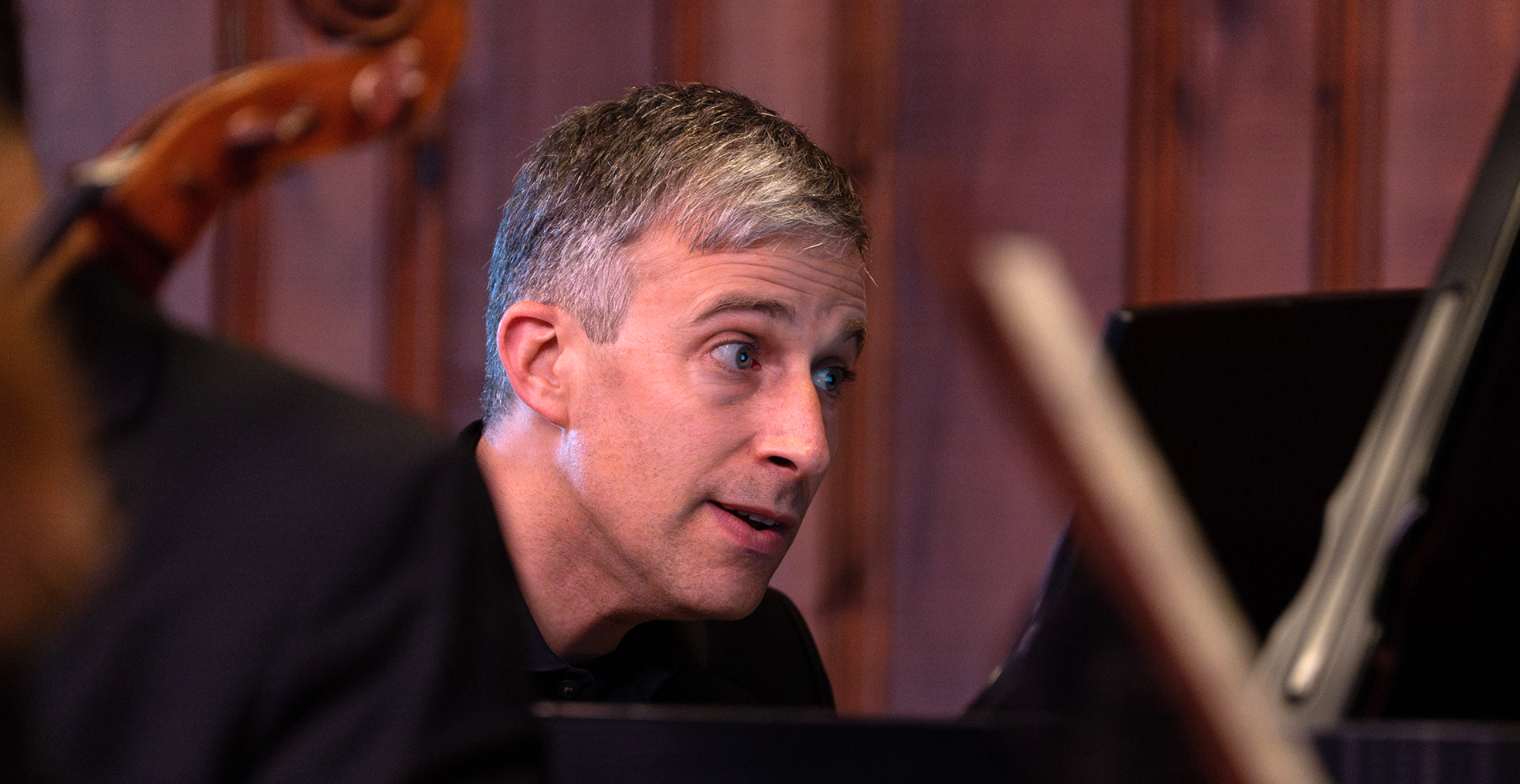
Benjamin Hochman performing at Music Mountain in 2023
BvB: You mentioned new music. What new and compelling music is being composed these days?
BH: I love working with composers. I recently had a lesson in Budapest with the Hungarian composer György Kurtág, who is now 97. That was very inspiring, both because I admire his music so much, and also because he is a composer whose music is placed very much within a tradition - just as Béla Bartók was before him. He is the kind of composer who is deeply interested in the lineage of composers who came before him.
Another composer I greatly admire is the British composer George Benjamin. I have been working on his Shadowlines, a set of canons for piano, on which I had an opportunity to work closely with him and which I plan to record. Recently, I attended the premiere of his latest opera in Aix-en-Provence and also assisted him with another production of one of his operas.
These days, I am thinking of Kaija Saariaho, the great Finish composer who sadly passed away last year. I was lucky to premiere her piano trio. She was a magical figure of our time, a unique personality and a distinctive voice.
BvB: How is performing pieces by living composers who you have worked with different from playing Beethoven sonatas that you have heard your colleagues perform multiple times?
BH: The biggest difference is that with a living composer you can ask them questions. The printed score is always an approximation of the music, it is never absolute. Let me give you an example: If you see a marking like forte - yes, that is loud. But how loud? To be able to ask the composer: what did you mean with this marking? Do you really mean it like this? Each composer has a unique personality, some are very open to suggestions, others don’t welcome it as much. Knowing that they are human beings, that you can speak and interact with them, sense their energy - all of this makes a huge difference to the music-making itself.
BvB: We are speaking across continents. I don’t really know where you live - Berlin, New York, you are traveling a lot. Where is home? I have always felt that music gives me a sense of connectedness wherever I am at a given moment. What makes you feel that you belong?
BH: Big questions! Home is where I can rest and be with my loved ones. At the moment, that is here in Berlin where I live. Since I was born and raised in Israel, another interpretation of home is where my heart is, definitely my heart is in Israel, my mother and brother and his family live there. Of course, this is a very difficult and tragic time. When there is war, one feels that connection even more. Plus, I lived in New York for a very long time, for nearly twenty years. I still come to New York regularly, so this is also a kind of home. I feel comfortable knowing that I have friends and family in different places. And as you referenced, music is such an international language. It can sound like a cliché, but it is also very true. As a musician, travel is an essential part of what I do, I perform all over the world, and sharing music with others creates connection.
BvB: You mentioned the war in Israel - we are all very concerned. What kind of music helps you stay optimistic, what is essential in troubling times?
BH: I have been playing a lot of Bach. I feel that Bach is the alpha and omega, his music has a magical quality: for the soul, the mind, the intellect and the spirit. There is nothing that can quite compare to that. Schubert is another composer I return to often: his humanity, his soulfulness and vulnerability are powerful and sublime.
BvB: Since you are based in Berlin you might be in contact with the Barenboim-Said Academy. Knowing more about their mission, their international faculty and students I want to believe that we, as music lovers, can make a difference in conflicts small and large.
BH: Absolutely. In a philosophical sense, I agree. But also in a practical sense. I have been speaking with colleagues at the Barenboim-Said Academy who speak with admiration about the students’ ability to speak to one another. No-one claims it is easy, of course, it can be very difficult. I was impressed about how they spoke about the young musicians’ ability to somehow communicate with one another and to overcome the tensions that exist in this difficult time. That gave me hope.
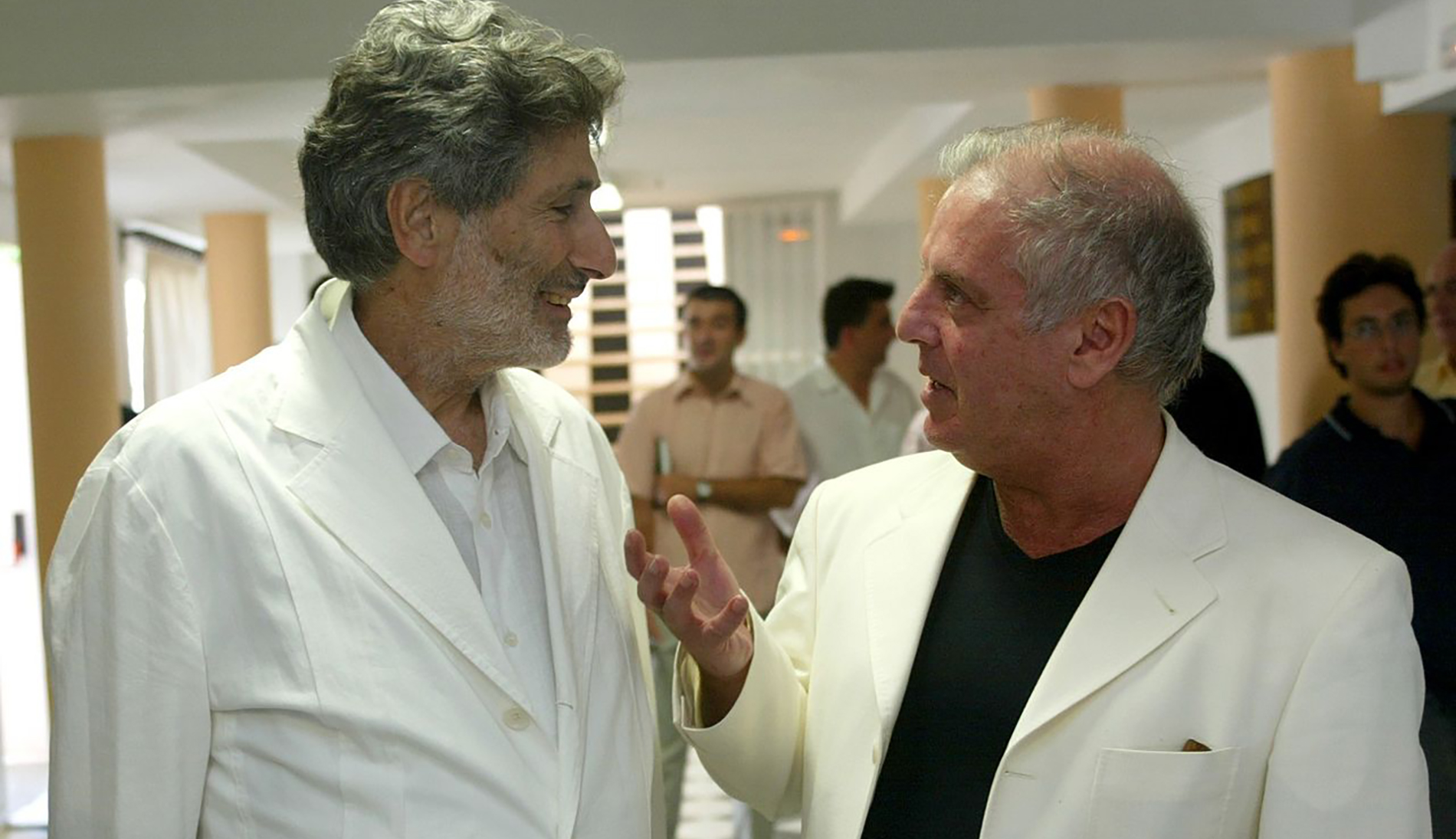
Edward Said and Daniel Barenboim in Seville, 2002. The creation of the Barenboim–Said Akademie in 2015 was rooted in a pre-existing peace project, the West-Eastern Divan Orchestra. The Barenboim-Said Academy, which emerged from the Orchestra, offers a program jointly in the music and in humanities, with the intent "to train excellent musicians who are also curious and well-educated." Edward Said said of the founding of the Western-Eastern Divan Orchestra: "Separation between peoples is not a solution for any of the problems that divide peoples. And certainly ignorance of the other provides no help whatever. Cooperation and coexistence of the kind that music lived as we have lived, performed, shared and loved it together, might be."
I have been speaking with colleagues at the Barenboim-Said Academy who speak with admiration about the students’ ability to speak to one another. No-one claims it is easy, of course, it can be very difficult. I was impressed about how they spoke about the young musicians’ ability to somehow communicate with one another and to overcome the tensions that exist in this difficult time. That gave me hope.
—Benjamin Hochman
BvB: What is your hope for your own future as a musician?
BH: To continue to make music at the highest level for many years to come.
BvB: Any preference over being a conductor or a soloist?
BH: I don’t feel that I have to choose. Life has its way of making its own choices. Thus, one has to keep doing what one believes. That is what I do. All my different musical activities contribute to learning and growing - and that never ends. I am strongly committed to that in my artistic life. I feel more and more that the most important thing is to remain committed to making music at the highest level. That takes dedication, hard work, and good choices, also in terms of the partners one chooses to make music with. Life does not go on forever, and our energy is not unlimited. One has to decide: these are the things I care about and believe in, and then cultivate and protect them.
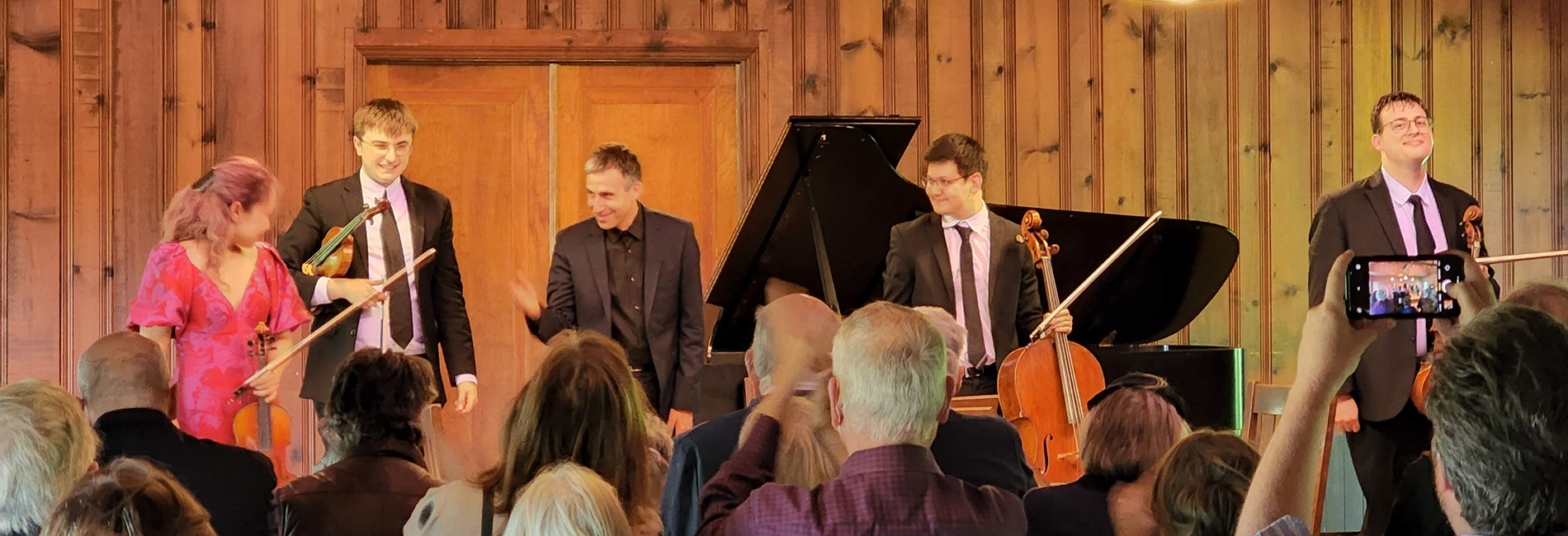
Benjamin Hochman and the Balourdet Quartet at Music Mountain in 2022
About the author, Barbara von Bechtolsheim
Barbara von Bechtolsheim, Ph.D, is Vice President of Music Mountain's board of directors. She studied German literature, psychology, philosophy, and biology in Bonn, Munich and at Stanford University where she received her PhD. Over the years, Barbara has contributed to the transatlantic dialogue as a translator of contemporary North American literature and as an author. Her recent research about creative couples explores the divide between biographical study and formalistic analysis. In Paare (2022) and Hanna Arendt und Heinrich Blücher (2023) she discusses creative relationships in the context of their respective cultural, historic, and psychological life trajectories.
Among her twenty literary translations are books by authors Louise Erdrich, Mavis Gallant, Diane Middlebrook, Toni Morrison, Joyce Carol Oates.
She has taught a range of literature and language courses at Sacred Heart University in Fairfield, CT, and at Free University in Berlin and at Leuphana University in Lüneburg, Germany, as well as seminars on Intercultural Skills at Hochschule für Medien, Kultur und Wirtschaft in Berlin.
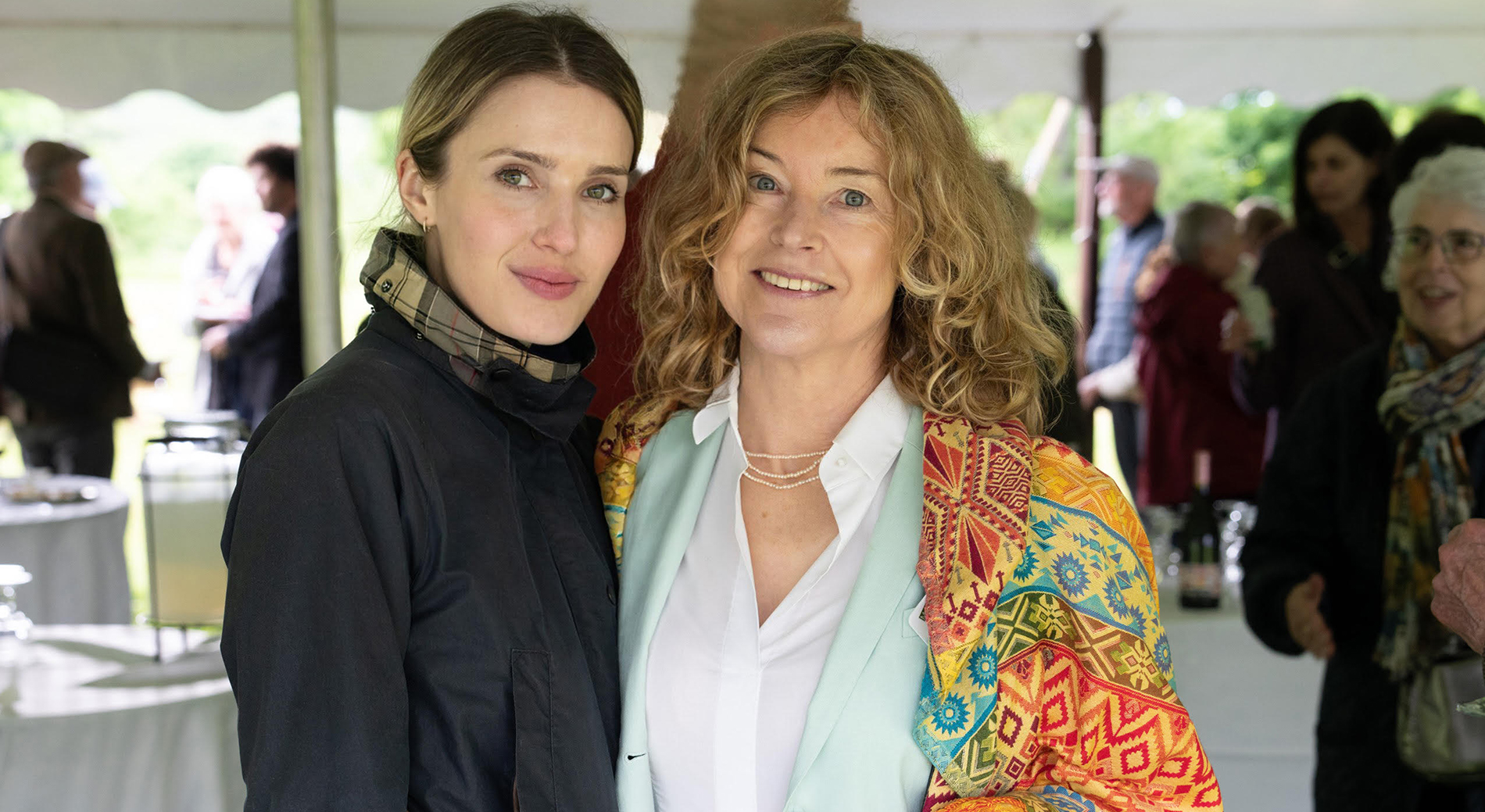
Barbara von Bechtolsheim, wearing a colorful shawl at Music Mountain in 2023, with her Yale student, Theresa Kauder, who was a volunteer at the concert.
